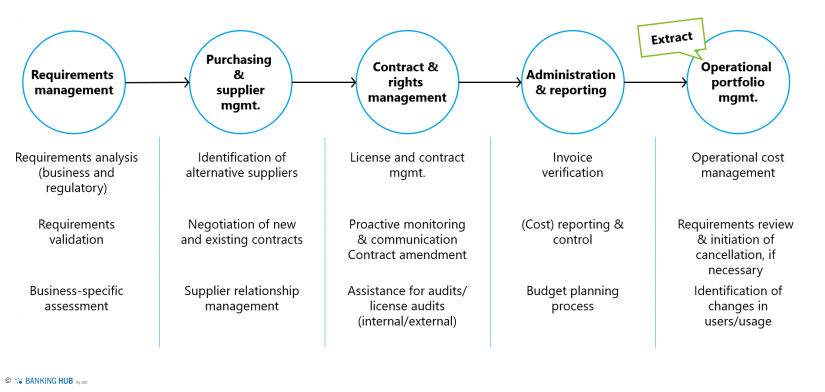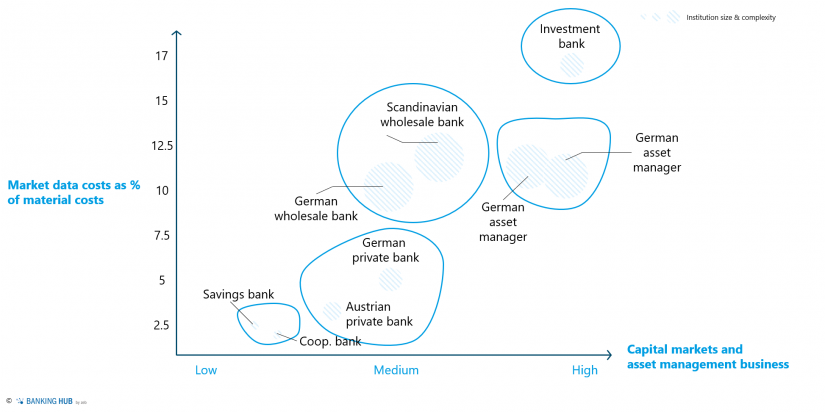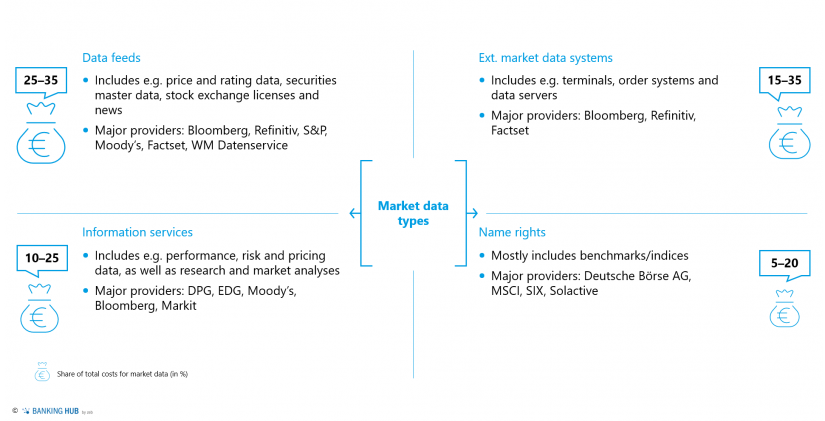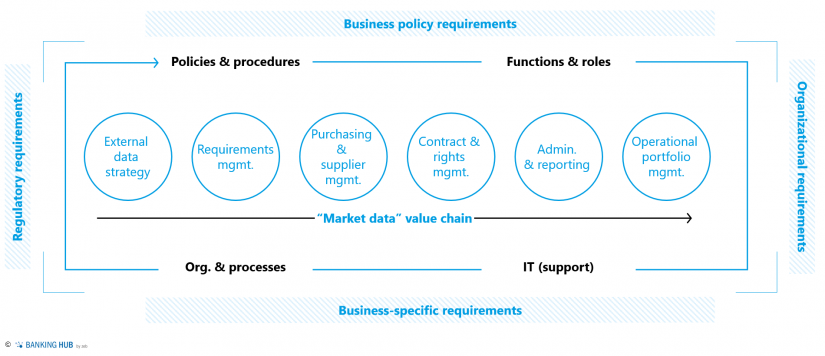The importance of data as the new raw material in the digital age is undisputed. Especially in the financial services sector, business models and the underlying value chains are increasingly data-driven. In investment banking and asset management, market data has an enormous importance. There, its availability and quality have long been a differentiating factor in the competition.
But what purpose does market data have in the capital markets and asset management business?
We are having a look at this question in the following article, with a focus on establishing a market data governance:
Business models in capital markets and asset management business with increasing procurement of market data
Market data can be used in various ways in the capital markets and asset management business. Real-time data is used for algorithms or for calculating risk models. Structural and performance evaluations, for example, are based on rating and index data.
Against this background, it is hardly surprising that market data has also been growing continuously and disproportionately as a cost pool. The entire market data management is often the second largest pool of material costs for investment banks and asset managers, with IT ranked first. These players therefore also need to effectively manage this cost pool and the procurement of market data and the relating costs to ensure competitiveness.
When it comes to market data, market and institution-specific features must also be taken into account. On the one hand, the competition features oligopolistic structures with providers holding considerable power—with market data terminal providers such as Bloomberg and Refinitiv or the highly concentrated market of rating providers as some examples. On the other hand, financial services providers have a particularly high demand for the necessary special know-how among market data users, purchasers and administrators.
zeb’s hands-on experience reveals major weaknesses in the management of the market data material cost pool
A recurring pattern from zeb’s extensive hands-on experience has made one thing clear: The management of the “market data” material cost pool often shows significant weaknesses in the following subject areas:
-
- Lacking market data strategy (business + technical)
Practice has shown that institutions often do not have a dedicated market data strategy that sets the framework for procuring market data. Hence there is a lack of clear guidelines, for example with regard to overall cost control, provider selection or the interaction between professionally driven market data requirements and the corresponding market data-related IT application landscape. - No clear delineation and classification of market data
Often, cost items are allocated to market data without observing clear guidelines. Consequently, different cost centers and divisions use different criteria for allocating cost items as market data. This further complicates an effective management. Clustering and controlling of market data according to a uniform classification is also often carried out to an insufficient degree.
- Lacking market data strategy (business + technical)
- Lack of transparency in contracts
Contract data management is often unable to cope with the complexity and scope of contracts. Data providers sometimes deliberately conclude their own contracts or contract amendments directly with market data end users, which in turn makes it even more difficult to establish a holistic view. Due to the poor and sometimes lacking communication of market data end users with market data management, such costs cannot be identified nor controlled. - Insufficient knowledge about the use of market data
Another major weakness in managing market data is the lack of transparency about the actual use of market data. This applies in particular to systemic data, i.e. data that is not used in a personalized manner. As a result, changes in market data procurement requirements are not recognized in good time (e.g. no cancellation of market data that is no longer required), and license risks may arise in consequence of improper use. - Lack of a holistic IT view in the market data context
When it comes to IT architecture, you will often find a heterogeneous, historically grown market data infrastructure. There is no overarching, summarizing IT architecture that comprehensively addresses the market data topic. There are multiple accesses to the same market data vendors, and data is exchanged directly between the systems. As a result, there is a large number of interfaces with complex market data flows.
These five weaknesses lead to a less-than-ideal active management of market data costs. This reveals a high degree of untapped savings potential. Institutions expose themselves to unnecessary risks, in particular license risks resulting from unclear and improper use. For the institution as a whole, therefore, the ability to plan future market data costs is limited.
BankingHub-Newsletter
Analyses, articles and interviews about trends & innovation in banking delivered right to your inbox every 2-3 weeks
"(Required)" indicates required fields
zeb solution: developing and implementing an independent market data governance and creating the conditions for actively managing the “market data” material cost pool
zeb’s experience shows that three levers are essential for a sustained reduction of market data costs.
In addition to the identification and conceptual design of business-specific and technical savings potentials (1), it has to be ensured that these potentials are leveraged in the course of provider negotiations (2). However, in this article we would like to focus on the establishment of an independent market data governance (3) as the final and decisive lever. This creates the necessary framework to ensure sustained cost reduction through active management of the market data budget.
The zeb.Governance Framework serves as a starting point for establishing an independent market data governance:
The following points should be particularly considered in the further design of the framework:
-
- Developing a value-chain-based E2E market data process
Based on the defined market data value chain, all essential process steps need to be coordinated and specified institution-wide and tasks and responsibilities have to be defined. The process model is the basis for the collaboration model within the governance. Figure 4 outlines an extract of the typical market data process design.
- Developing a value-chain-based E2E market data process
 Figure 4: Exemplary E2E market data process
Figure 4: Exemplary E2E market data process- Clearly defined roles and responsibilities
To ensure that market data governance is put into practice, clear roles and responsibilities must be defined along the market data process. It makes sense here to identify central and decentralized elements. A strong market data management unit should be established centrally. The Vendor and License Manager is located in this unit as a specialist for purchasing and contracts and operationally supported by the Market Data Admin. The Budget Manager is also based there as a specialist for management accounting issues. Independent competence centers should be established locally. Here, the decentralized Demand Managers act as an important link between the market data users they represent and the central market data management unit. The central and decentralized elements must also be supported by a Market Data Officer in IT. This person coordinates the development and optimization on the basis of technical specifications. - Establishing committees, reporting and escalation channels
A two-tier committee structure should be established to meet the challenge of regular cross-divisional dovetailing in the context of market data. Working groups with an operational focus can be used to discuss and develop the latest business-specific topics with regard to market data and to prepare important resolutions and decisions. In addition, a high-level strategy committee should take interdisciplinary decisions relating to market data, enhance the market data (sourcing) strategy, monitor market data costs and further develop the market data governance.
Establishing a market data governance helps institutions to increase their competitiveness and profitability
With a company-wide rollout of the market data governance, institutions have the opportunity to establish consistent cost control. In addition, independent business-specific and technical market data strategies together with a sourcing strategy can be established in appropriate market data committees. A clearly structured E2E process lays the foundation for a uniform collaboration model with clearly defined roles and responsibilities. Future-oriented target images of an optimized market data IT architecture can be adapted to current and future market data usage and the business model, and vice versa. In this context, it is essential to centralize market data flows and reduce the number of interfaces.






